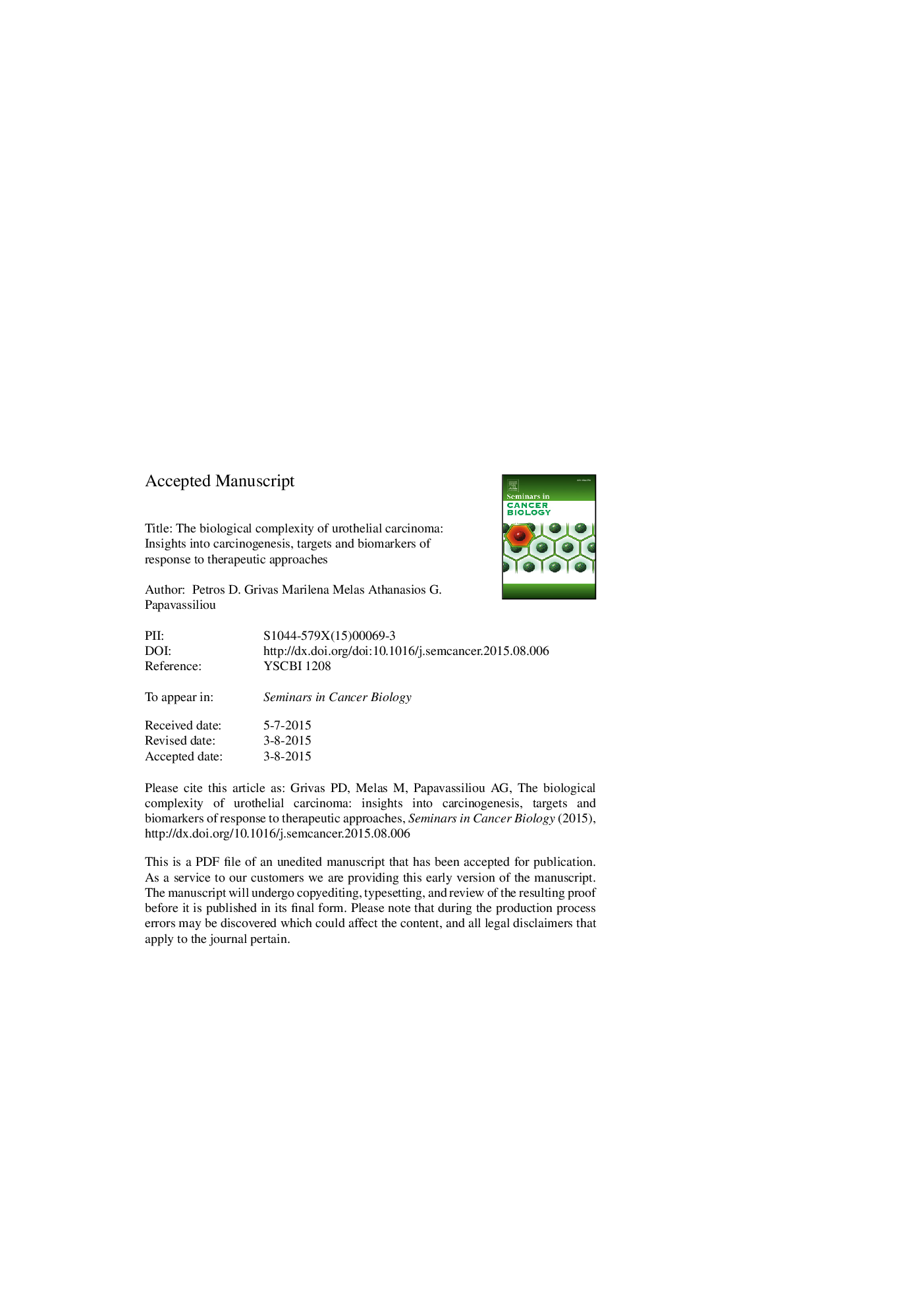| کد مقاله | کد نشریه | سال انتشار | مقاله انگلیسی | نسخه تمام متن |
|---|---|---|---|---|
| 8362164 | 1542532 | 2015 | 35 صفحه PDF | دانلود رایگان |
عنوان انگلیسی مقاله ISI
The biological complexity of urothelial carcinoma: Insights into carcinogenesis, targets and biomarkers of response to therapeutic approaches
ترجمه فارسی عنوان
پیچیدگی بیولوژیکی کارسینوم اورکتیال: درک به سرطان زایی، اهداف و بیومارکرها پاسخ به رویکردهای درمانی
دانلود مقاله + سفارش ترجمه
دانلود مقاله ISI انگلیسی
رایگان برای ایرانیان
کلمات کلیدی
موضوعات مرتبط
علوم زیستی و بیوفناوری
بیوشیمی، ژنتیک و زیست شناسی مولکولی
زیست شیمی
چکیده انگلیسی
Bladder cancer is a major cause of morbidity, mortality and health-related costs. Urothelial carcinoma is by far the most common histologic type of bladder cancer and may also arise from the upper urinary tract, e.g. renal pelvis and ureter, as well as from the proximal urethra. There have been no major advances in the development of new systemic therapies for urothelial carcinoma for over two decades, which may be related to prior lack of profound comprehension of biological pathogenetic mechanisms. However, in the last few years there has been a major shift in the development of new promising therapies that stem from improved molecular profiling of this malignancy. Developments in molecular biology, genomics, bioinformatics and immunology provide a solid foundation for therapeutic advances. A plethora of novel treatment targets and biomarkers are being evaluated, but there has been no molecular biomarker with established clinical utility so far. Genomic characterization of each patient's tumor has not been implemented due to the high cost, lack of validated standardized techniques that could be available in different laboratories, as well as absence of validated biomarkers and available therapeutic agents with clinically proven benefit. However, genomic characterization before treatment has now started to be implemented in novel clinical trial designs in order to contribute to proper patient selection based on biomarker-based enrichment strategies. Several “umbrella” or “basket” type, molecular biomarkers-based trials, in which patient eligibility and/or stratification is based on the presence of specific genetic alterations regardless of tissue of origin and/or histology, are being launched. Mathematical models and bioinformatics platforms that perform high level computational integrated pathway analysis may reveal clinical relevant signaling pathways amenable for targeting in individual patient tumors. Moreover, the high mutational burden of urothelial carcinoma may create numerous neo-antigens that may explain the very promising results with immune checkpoint inhibitors in early phase clinical trials. A combination of several, e.g. DNA, mRNA, miRNA, protein, and other molecular biomarkers merit further investigation, but this process has to be based on stringent criteria that test and prove clinical utility.
ناشر
Database: Elsevier - ScienceDirect (ساینس دایرکت)
Journal: Seminars in Cancer Biology - Volume 35, December 2015, Pages 125-132
Journal: Seminars in Cancer Biology - Volume 35, December 2015, Pages 125-132
نویسندگان
Petros D. Grivas, Marilena Melas, Athanasios G. Papavassiliou,
